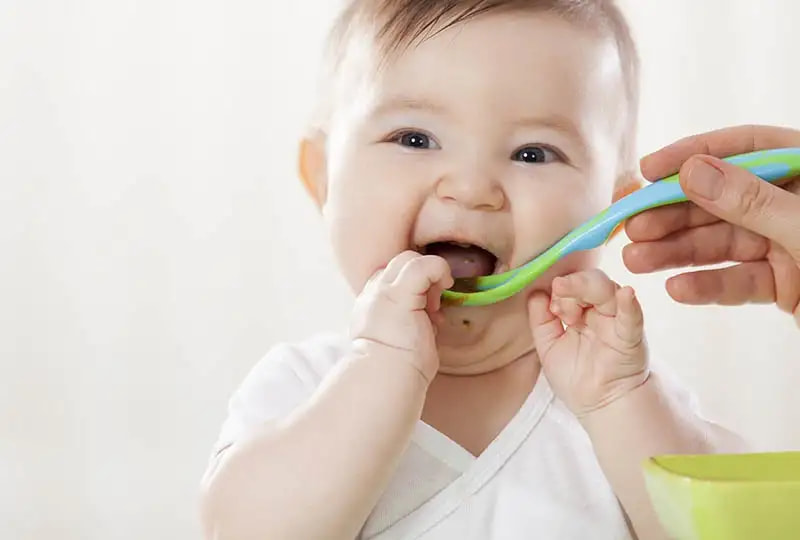
VIEW PRODUCTS
Article Continues below advertisement
- Home

- Finger Foods

- Are you wondering when can you start feeding finger foods to your baby? Here's a complete guide.
In this Article
Finger Foods
Are you wondering when can you start feeding finger foods to your baby? Here's a complete guide.
Updated on 29 January 2022
Article Continues below advertisement
Babies love to imitate everyone especially when the family sits together for a meal. You can encourage your little one to start the journey of eating independently after you celebrate his/her half birthday. Although your baby may not fully master the skill of pincer grip until 6-7 months, it is good to familiarize them with an idea of finger foods. Gradually your child will achieve the dexterity to pick up tiny bits of food. Eating finger foods (easy-to-eat food items) will help your child develop their eye-hand coordination and fine motor skills. Some parents introduce finger foods to their little ones as soon as they turn 6 months old however according to the experts you must observe and look out for the signs that indicate he/she is ready to eat. Even though every child’s growth and development process are different but, in most cases, your baby would start showing signs when he/she turns 8-9 months old.
Initially, the process can be challenging, and pint-size will be going in his/her mouth because the baby creates a lot of mess by picking the food items and throwing them around. If you are wondering how to begin this journey then first and foremost you should get a comfortable high-chair for your munchkin, child-friendly plate, bowl, glass, and cutlery. To start, give him/her a little bit and you can refill once your munchkin completes eating that portion. You must always aim to give healthy finger foods to your little one. Ensure the food is cut into small pieces and properly cooked so that it’s easy for your baby to chew and digest it. Consult a pediatrician if you are concerned about food allergies and introduce 1 new food at a time. Here are some of the best finger-food options for your little one:
-
Slices of fresh fruits make very healthy finger foods. You can use slices of apple, banana, mango, watermelon, ripe peaches, papaya, kiwi, and musk melon.
-
Steamed or boiled vegetables like cauliflower florets, pumpkin, carrots, sweet potato, and potato.
-
If you want to introduce the fresh taste of raw vegetables to your baby then you can offer thinly sliced cucumber or thin tomato wedges to your child after deseeding them.
Article continues below advertisment
-
Gradually your baby will love picking tiny vegetables from the dining table like boiled green peas, sliced grapes, sweet corn, peanuts, and beans. Make sure there are no choking accidents.
-
He/she would love to eat anything that is soft and chewy like mashed purees and soft vegetable parathas.
-
Your baby will love to nibble lightly toasted bread.
-
Your little munchkin can easily chew small pieces of pasta and small cubes of tofu.
-
Before introducing eggs in any form, you must consult a pediatrician first. Scrambled eggs and hard-boiled eggs can be cut into tiny pieces before offering them to your baby.
Article continues below advertisment
Here are some of the finger foods that you must strictly avoid offering to your little one because they are unhealthy and can cause choking:
-
Large chunks of raw vegetables.
-
Fruits and vegetables that are not properly washed or are leftovers in the fridge.
-
Avoid feeding nuts, popcorns, chewing gums, nut butter, marshmallows, candies, raisins, and other jelly-like food items.
-
Always remember to deseed the fruit and vegetable before offering it to your little one.
Article continues below advertisment
-
Avoid giving unroasted bread, fatty foods, sweet items, and chewing gum to your little one.
-
Offer only age-appropriate finger foods to your baby by introducing larger foods first and then slowly moving on to smaller pieces. Make sure you never introduce finger foods before 6 months to your baby.
-
Do not compromise on the feeding sessions be it breastfeeds or formula feeds.
-
Do not offer packaged and canned food products to your munchkin.
-
Do not add salt and sugar to your child’s meal until their 1st birthday.
Article continues below advertisment
-
Have patience because your baby will gradually develop the habit of chewing and digesting finger foods.



Written by
Parul Sachdeva
A globetrotter and a blogger by passion, Parul loves writing content. She has done M.Phil. in Journalism and Mass Communication and worked for more than 25 clients across Globe with a 100% job success rate. She has been associated with websites pertaining to parenting, travel, food, health & fitness and has also created SEO rich content for a variety of topics.
Read MoreGet baby's diet chart, and growth tips

Related Articles
RECENTLY PUBLISHED ARTICLES
our most recent articles
Motherhood
7 Advantages of Being a New Mom
Baby Shower
Learn all the important do’s and don’ts of hosting a baby shower.
Diet & Nutrition
Make an interesting diet chart for your 11-months-old baby
Growth Charts
Know more about Infant developmental milestones for 7-12 months old.

Water Break
Water breaking: What it feels like.
Ayurveda & Homeopathy
Golden tips of Ayurveda for pregnant women to keep the spirits high
- What is Preeclampsia?
- Know all about Annaprasan ceremony of your baby and how to celebrate it.
- Top 5 Things to Help you get Pregnant
- Have you prepared a shopping checklist for your first trimester? Hope you haven't missed these 5 important things.
- Planning to go back to work after the birth of your Baby? Here are 10 Awesome Tips to Help you Manage
- 5 Safe and Effective Core Exercises for New Moms
- Top 6 Fears during Pregnancy and Why you shouldn't worry about them?
- How does practicing Garbha Sanskar during 9 months of pregnancy help women deliver a healthy baby?
- Do you believe in Ayurveda? Here are some important Ayurvedic suggestions for a pregnant woman.
- Here are some interesting tips that can help you effortlessly manage your office work, baby care, and domestic duties.
- Planning a babymoon? Here are some tips to make it a relaxing and healthy one
- What are the few ways to manage hormonal changes in the body that every woman goes through during pregnancy?
- 5 finance management tips for new parents
- Symptoms and Causes of Cold in Infants

At Mylo, we help young parents raise happy and healthy families with our innovative new-age solutions:
- Mylo Care: Effective and science-backed personal care and wellness solutions for a joyful you.
- Mylo Baby: Science-backed, gentle and effective personal care & hygiene range for your little one.
- Mylo Community: Trusted and empathetic community of 10mn+ parents and experts.
Product Categories
baby carrier | baby soap | baby wipes | baby shampoo | baby lotion | baby powder | baby body wash | stretch marks cream | stretch marks oil | baby cream | baby massage oil | baby hair oil |



